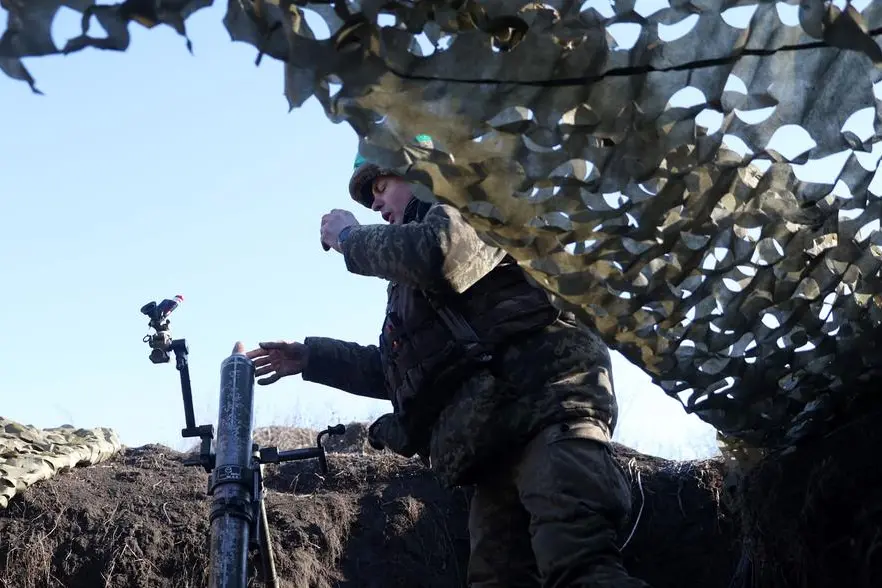PHOTO
Ukrainian troops were locked in a "fierce" confrontation with Russian fighters Friday for control of the town of Vugledar southwest of Donetsk as the two sides battle along the southern front.
Both sides claimed success in the small administrative centre of apartment blocks surrounded by flat fields, a short distance from the strategic prize of the village of Pavlivka.
"The encirclement and subsequent liberation of this city solves many problems," said Denis Pushilin, the Moscow-appointed leader of the Donetsk region.
"Soon, Vugledar may become a new, very important success for us," he was quoted as saying by Russian news agencies.
But Kyiv said the town, which had a pre-invasion population of around 15,000 people, remained contested.
"There is fierce combat there," Ukrainian military spokesman Sergiy Cherevaty told local media.
"For many months, the military of the Russian Federation... has been trying to achieve significant success there," he said.
Moscow's push for Vugledar is part of its effort to seize control of the entire Donetsk region, which it has already declared a part of Russia.
Ukraine said this week that Russian troops had stepped up their attacks in the east, particularly on Vugledar and Bakhmut.
And Moscow was preparing for a new offensive on February 24, the first anniversary of the Russian invasion, said Oleksiy Danilov, secretary of Ukraine's national security and defence council.
"Now they are preparing for maximum activation ... and they believe that by the anniversary they should have some achievements," Danilov said on Radio Svoboda.
"There is no secret that they are preparing for a new wave by February 24, as they themselves say," he said.
According to the US-based Institute for the Study of War, Russian forces may be engaging in a series of spoiling attacks "to disperse and distract Ukrainian forces and set conditions to launch a decisive offensive operation".
- Barbs on Holocaust Remembrance Day -
Russian President Vladimir Putin used International Holocaust Remembrance Day on Friday to lash out at Ukraine, calling those in the country "neo-Nazis" to justify the 11-month-old invasion.
"Forgetting the lessons of history leads to the repetition of terrible tragedies," Putin said.
"It is against that evil that our soldiers are bravely fighting."
But in Poland, where some three million Jews were slaughtered during World War II, officials pointed their fingers at Russia as perpetuating Nazi thinking.
"On the anniversary of the liberation of the Nazi German death camp Auschwitz-Birkenau, let us remember that to the east Putin is building new camps," Polish Prime Minister Mateusz Morawiecki said on Facebook.
"Solidarity and consistent support for Ukraine are effective ways to ensure that history does not come full circle," he added.
Ukrainian President Volodymyr Zelensky marked Holocaust Remembrance Day by urging the world to unite against "indifference" and "hatred".
"Today, as always, Ukraine honours the memory of millions of victims of the Holocaust. We know and remember that indifference kills along with hatred," he said.
- More Polish tanks -
Morawiecki, meanwhile, said Poland would deliver an additional 60 tanks to Kyiv to help it fend off Russia's aggression.
"Right now, we are ready to send 60 of our modernised tanks, 30 of them PT-91. And on top of those tanks, 14 tanks, Leopard 2 tanks, from our possession," he said.
The tanks that have already been sent by Poland are mainly T-72 Soviet models, of which the PT-91 is a modernised version.
Ukraine has also been promised battle tanks from Germany and the United States, announced earlier this week.
And Belgium announced a new 93.8 million euro ($100 million) package of military aid for Ukraine that includes cash, missiles, machine guns and armoured vehicles.
- Olympics controversy -
Meanwhile, controversy boiled over the International Olympic Committee's efforts to find a "pathway" for Russians to take part in the 2024 Paris Games despite the invasion of Ukraine.
Russia and its ally Belarus have been sidelined from most Olympic sports since the invasion of Ukraine last February.
But the IOC said "no athlete should be prevented from competing just because of their passport".
Paris Mayor Anne Hidalgo said Thursday that she supported the concept of Russian athletes competing under a neutral banner at the 2024 Olympics.
Zelensky on Friday invited IOC President Thomas Bach to visit the frontline city of Bakhmut, where some of the heaviest fighting has taken place in recent months.
"I am inviting Mr Bach to Bakhmut so that he can see for himself that neutrality does not exist," Zelensky said.
"It is obvious that any neutral banner of Russian athletes is stained with blood."
Ukraine's sports minister warned his country could boycott the games if Russian and Belarusian athletes take part.





















